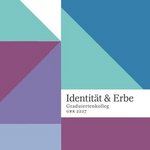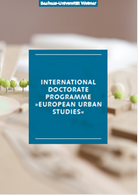- Official Instagram account of the Bauhaus-Universität Weimar
- Official LinkedIn account of the Bauhaus-Universität Weimar
- Official Vimeo channel of the Bauhaus-Universität Weimar

The Bauhaus-Universität Weimar offers structured doctoral programmes in addition to the individual doctorate. An intensive support aims at a degree within three years. Supplementary courses impart disciplinary as well as transferable skills. Especially young researchers benefit from manifold assistance: teamwork, curriculum, supervision by several professors and practical application constitute a framework for successful projects.
The Research Training Groups of the Bauhaus-Universität Weimar offer positions for doctoral candidates and post-docs. Ph.D. candidates in other structured programmes are self dependent for their funding. They may apply for a scholarship from one of the organizations for the promotion of young talent or for a scholarship directly the Bauhaus-Universität Weimar.
If your research interest fits into one of the doctoral programmes of our university, you may apply directly at the programme. Please note the application deadlines and the doctoral regulations of the respective faculty.
Research Training Group (DFG) Gewohnter Wandel

Social conflicts, ecological needs and the digitalisation of the living environment: if current social developments are shaping the built environment of tomorrow, what challenges, problems and contradictions will this cause for housing?
From autumn 2024, young researchers in Weimar and Frankfurt will conduct interdisciplinary research on the current housing situationin the the joint research training group (Graduiertenkolleg, GRK) "Gewohnter Wandel. Social Transformation and Spatial Materialisation of Housing", funded by the German Research Foundation (DFG). Over the entire funding period of nine years, up to 36 doctoral theses on housing issues can be completed. > more info
Research Training Group (DFG) Identity and Heritage

The research training group »Identität und Erbe« started as a joint programm of the TU Berlin and the Bauhaus-Universität Weimar in October 2016 with all in all 12 doctoral positions (6 at each university). The first group (2016–2019) is still working on their doctorates in Weimar and Berlin. The following subjects are involved: architecture, architectural theory, history of building and urban development, fine arts, monument preservation, history of art and architecture, history of culture and media, landscape architecture, planning and architectural sociology, spatial planning and spatial research, urban planning.
The second funding period until 2025 has been approved. The interdisciplinary orientation of the GRK will be expanded in the new funding period to include archival science and the philosophy of science.
Please see here more of the latest news from the GRK.
Research Training Group (DFG) Medienanthropologie

The Research Training Group is primarily aimed at doctoral students of media studies, cultural studies, film and theatre studies, literary studies, philosophy, sociology, ethnology or one of the neighbouring disciplines.
The programme began its work in April 2020, the 2nd cohort started in summer 2023.
For more information, see www.uni-weimar.de/gkma
Doctoral Programme Art and Design

The degree course Art & Design offers a Ph.D.-degree created solely for Master and Diploma graduates of Art- and Design-Schools was the first of its kind in the German-speaking area since 2008. The graduation, supervised by two professors, one academic and one artist / designer, is concluded after a three-year curriculum. German and English knowledge is required. The final Ph.D.-thesis equally comprises of a scientific and an artistic/design part.
Prof. Dr. Alexandra Toland,
head of the programme; Junior Professor for Arts and Research
artsandresearch[at]gestaltung.uni-weimar.de
Application deadline is March 31st; the programme starts in the winter semester.
Open Online Consultation for all who want to apply:
10 November 2023 | 2 pm
09 February 2024 | 10 am
For insights in the program, please see "Working Titles", the online journal for practice-based and led research initiated by Ph.D. candidates enrolled in the Ph.D. program for art and design at the Bauhaus-Universität Weimar.
More information about the doctoral program you can find on the website of the Ph.D. program.
European Urban Studies (International Doctorate Programme)
From 2002 until 2020, the IPP for European Urban Studies was counted among the nationwide network of International PhD Programmes, which, within the framework of the programme "Doctorates at Universities in Germany (PHD)", were endorsed by the German Research Foundation and the German Academic Exchange Service. Supported in years 2002 to 2007, the IPP European Urban Studies was the only IPP in Germany that was dedicated to urban research. It dealt with topics that are tested against such current models as the "European City," "Compact City," "Social City," "Net City," or "Zwischenstadt".
The International Doctorate Programme “European Urban Studies” was then focusing on research on Urban Housing and Forms of Living with a focus on (multidimensional) housing policy, in the context of current societal challenges – such as climate change, social fragmentation, spatial disparity, cultural differentiation, immigration and the transformation of the real estate economy – and what these challenges imply for the cities of Europe.
Please note:
Until further notice, the program is closed. You can find out more about the individual doctoral opportunities in the field of "European Urban Studies" on this homepage.
UrbanHist - History of European Urbanism in the 20th Century

"UrbanHist − History of European Urbanism in the 20th Century" is a multidisciplinary research and training programme run by four universities in Germany, Spain, Slovakia and Sweden in cooperation with 13 partner-organizations and funded within the European Union’s Horizon 2020 research and innovation programme in the Marie Skłodowska-Curie Action - Innovative Training Networks (ITN) as European Joint Doctorate (EJD).
It aims to develop and sustainably promote a joint understanding of 20th century urbanism in Europe. 15 Early Stage Researchers will be researching in 8 thematic fields, embedded into a network of high-profile academics and practitioners.
Bauhaus-Universität Weimar; Univerzita Pavla Jozefa Šafárika v Košiciach, Slowakei; Universidad de Valladolid, Spanien sowie die Blekinge Tekniska Högskola, Schweden.
2016 – 2020
Please note: Currently no applications are being accepted for this programme.
Kompetenzzentrum Medienanthropologie (KOMA)
Period: April 2015 bis September 2019
Das aus Mitteln der ProExzellenz-Initiative des Freistaates Thüringen finanzierte Kompetenzzentrum Medienanthropologie soll eine innovative und interdisziplinäre Medienanthropologie vorantreiben, die die Erforschung der Medialität, der Medienbedingtheit und Medienverfasstheit menschlicher Daseinsvollzüge ins Zentrum stellt. Dabei ist das Konzept der Anthropomedialität forschungsleitend. Anthropomedialität beschreibt mit der Verschränkung von Menschen und Medien ein eigenständiges Drittes, das jeder Unterscheidung von Mensch und Medium als deren Ursprung vorausgeht.
Im Rahmen des Forschungsprogramms wurden 10 StipendiatInnen bei der Arbeit an ihrer Promotion unterstützt. Die Arbeit des Kompetenzzentrums mündete erfolgreich in der Beantragung eines DFG-Graduiertenkollegs zum Thema Medienanthropologie, das im April 2020 gestartet ist.
Sprecherin: Prof. Dr. Christiane Voss (Professur Philosophie audiovisueller Medien)
Stellvertretender Sprecher: Prof. Dr. Lorenz Engell (IKKM)
Weitere Informationen zum Forschungsprogramm und zu den beteiligten WissenschaftlerInnen finden Sie hier.
Contact:
Tim Othold M.A.
Coordinator/ Research assistant
Cranachstraße 47, room 005
Tel.: +49 (0) 36 43 / 58 40 03
Fax: + 49(0)3643 / 58 40 01
tim.othold[at]uni-weimar.de
Christiane Lewe M.A.
Coordinator/ Research assistant
Cranachstraße 47, room 006
Tel.: +49 (0) 36 43 / 58 40 06
Fax: + 49(0)3643 / 58 40 01
christiane.lewe[at]uni-weimar.de
Urban and Regional Research (German-Argentinian Doctorate Training Group)
Duration: 2013- 2020
The German-Argentinian Doctorate Training Group "Urban and Regional Research" is a cooperation between the Institute for European Urban Studies at the Bauhaus-Universität Weimar and the Faculty of Architecture, Planning and Design and the Faculty of Philosophy and Humanities at the Universidad Nacional de Córdoba /Argentinia.
The aim of this doctorate training group is to give a selective group of young researchers the opportunity and the academic support to achieve results in urban research that can enrich the academic debate in this field both in Europe and in Latin America. Doctorate students in the program receive bi-national academic advising and take part in a structured study programme. Successful completion of the programme results in the awarding of the academic title of Dr. phil or Dr. Ing in combination with a doctor title from the partner university. This doctorate training group is the first of its kind at a Thuringian university and one of few in Germany. A stipend funded by the Deutsch-Argentinischen Hochschulzentrum covers travel and living costs for the academic year abroad.
Currently no applications are being accepted for this programme.


